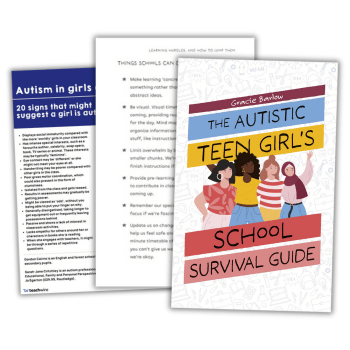Girls with autism – 10 things one pupil wants teachers to know

Libby Scott pens a letter to her teacher about the things she wishes they knew about how her diagnosis affects her at school…

- by Libby Scott

1. I cover my anxiety
Please understand that I often cover up my anxiety, and although I may appear calm and fine on the outside, this does not mean I am actually feeling it inside.
I have learnt to cover my real feelings at school as I want to fit in and not get into trouble. It’s hard to hold your real feelings in and pretend to be something you aren’t all day. Home is the only place where I feel I can let my real feelings out.
2. Show me you like me
Building a good relationship with me is the best way to help me feel calm and be able to behave and be my best. Show me that you like me, by smiling and connecting with me positively when you see me.
I respond really well to feeling liked. Please try not to criticise me or say negative things to me as I will feel that you don’t like me.
3. Don’t shout
Tone of voice and facial expression are really important to me as I read a lot more into them than other people do. If you have to tell me off, please do it in a calm way, rather than in a cross or harsh voice.
Please don’t make sudden loud noises like shouting at me, as this makes me anxious. Sarcasm and criticism make my anxiety levels go sky high.
Using nice language puts me at ease and will help me to focus on what you are actually saying rather than how it’s making me feel.
4. Don’t publicly shame me
Please, please, please, I beg of you, don’t punish me by doing anything that shames me in front of other people like detentions, making me stand up in front of others or telling me off in public.
This is my worst nightmare and my biggest fear in school. It doesn’t make me learn to behave better as I will be so anxious that I’m bound to do more things wrong.
Please just speak quietly to me on a one-to-one basis. I absolutely promise I will take in what you are saying better that way.
5. Ask me nicely
Ask me to do things calmly and pleasantly and try not to make it sound like a command as this instantly escalates my anxiety.
Trending
For example, you could say, “Would you mind coming up with a good way to make sure you remember your pencil tomorrow?”. This is a good way to phrase things for me.
6. Avoid direct questions
Don’t ask me lots of direct questions as these feel like demands and the pressure can be really stressful. Say things like: “Would you be happy to share your thoughts?”; “I’m wondering whether you…”; “I notice that…”; ”I was thinking you could…”.
7. Give me time
7. Give me time when asking me questions or when giving me instructions. Don’t get impatient with me or I will sense it and will be flooded with stress which makes it even harder to think straight.
8. Let me look where I want
Don’t ask me to make eye contact as a way of showing I am listening – it makes it harder for me to listen. If you really want me to be listening carefully to what you are saying, let me look wherever I need to so I can concentrate.
9. Offer choices
Please don’t force me into anything I do not feel ready or comfortable doing. I’m always pushing myself out of my comfort zone, but I can only do it when I feel in control.
I will usually give most things a try when I feel ready to. Give me some control by offering choices; this always makes me feel more relaxed and motivated.
10. Be empathetic
Most of all, please try to put yourself in my shoes and know that I don’t choose to be this much work – this might be annoying for you but believe me, it is 10 squillion times harder for me.
From Libby
Libby Scott is 12 years old and co-wrote her second novel, Do You Know Me? (£6.99, Scholastic), alongside author and teacher Rebecca Westcott. Find them on Twitter at @bloglibby and @westcottwriter. Browse more resources for Autism Acceptance Week, including our autism in girls checklist.










